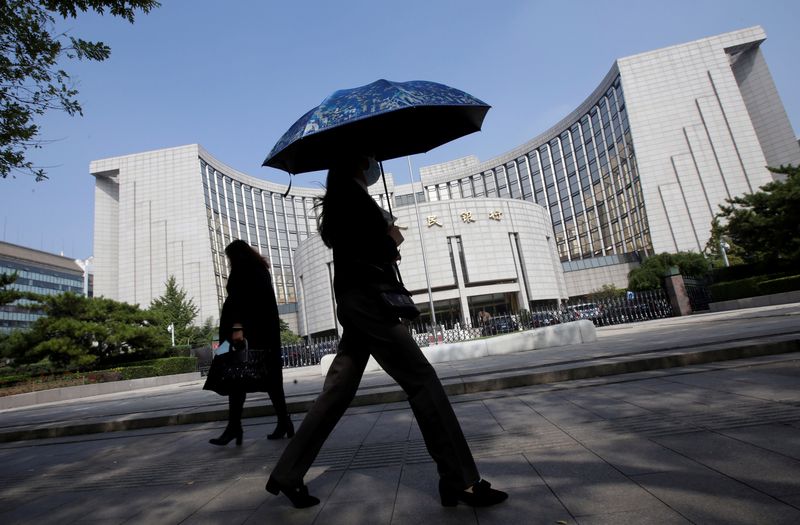By Kevin Yao
BEIJING (Reuters) - China's central bank has plenty of reasons to loosen policy as deflationary pressures in the economy deepen, but record credit growth is likely to limit the extent of any monetary support it's able to provide.
While the recovery from last year's pandemic slump in the world's second-largest economy gathered pace in the first quarter, the upbeat headline figures mask the underlying weakness in both household and external demand.
"China is entering an 'atypical' deflation cycle, which means deflation amid economic recovery," said Jinyue Dong, senior economist at BBVA (BME:BBVA) research.
Despite the bounce in growth, consumer price inflation is slowing sharply, and factory gate prices are in free fall, increasing pressure on the People's Bank of China (PBOC) to cut rates or release more liquidity into the financial system.
But analysts and government think-tanks say doing so offers little benefit, because of structural restraints on demand, and fuels financing risks in an economy whose debt burden is almost three times its output. China's new bank lending hit an all-time high in the first quarter.
The central bank cut lenders' reserve requirements ratio (RRR) for the first time this year in March. Analysts now expect any further easing to be modest in size and most don't expect any major near-term action.
"There is still room to cut rates and RRR, but the effectiveness cannot be overestimated," said Xu Hongcai, deputy director of the economic policy commission at the state-backed China Association of Policy Science.
"It's useless to provide more money as liquidity is sufficient but demand is not picking up – it's a structural problem."
Household consumption growth has lagged the expansion in investment and manufacturing for decades, and there is little sign this trend - which many economists have flagged as China's key structural weakness - is about to shift sustainably.
Retail sales did outpace industrial output in March. But analysts say that is largely due to last year's low base caused by COVID-19 curbs that hit consumers the hardest, rather than underlying household demand.
"The 10% retail sales growth looks amazing, but it is not really so amazing because the base effect is huge," said Alicia Garcia-Herrero, chief economist for Asia-Pacific at Natixis.
NEGLECTED HOUSEHOLDS
Beijing has pledged to prioritise consumer-driven growth this year, but policies so far have channelled funds into large infrastructure projects, manufacturing and other sectors the government deems as strategic.
Bank lending in the first quarter followed a similar path.
New household loans, mainly mortgages and consumer loans, accounted for 16% of total new loans in the first quarter, despite a jump in mortgages in March, while corporate loans made up for the rest.
Households' share is even lower than last year, when it plunged to 18% from 40% in 2021.
"There is limited room for the PBOC to play its part in reviving household income expectations, as it may require a more holistic approach to reboot confidence in job security," said Tommy Xie, China economist at OCBC Bank.
The labour market remains weak, with youth unemployment near record highs of 20%. Consumer confidence is off record lows, but remains below the range set over the past two decades.
"The focus of macroeconomic policies has not yet transitioned from protecting market entities on the supply side to protecting low- and middle-income families on the demand side," said Zhang Ming, senior economist at the state-backed Chinese Academy of Social Sciences, in a recent report.
Worryingly for PBOC, its latest survey showed that in the first three months of the year, the share of respondents saying they preferred to save was still high at 58%, albeit down 3.8 percentage points from the prior quarter.
New household deposits were 9.9 trillion yuan ($1.4 trillion) in January-March – more than half the record 17.8 trillion yuan reported for all of last year.
As Western economies grapple with inflation, Chinese policymakers have contrasting concerns.
"Demand is weak and supply is excessive, that's for sure," a policy adviser said on condition of anonymity.
"We see some deflation risks."
($1 = 6.8744 Chinese yuan)
